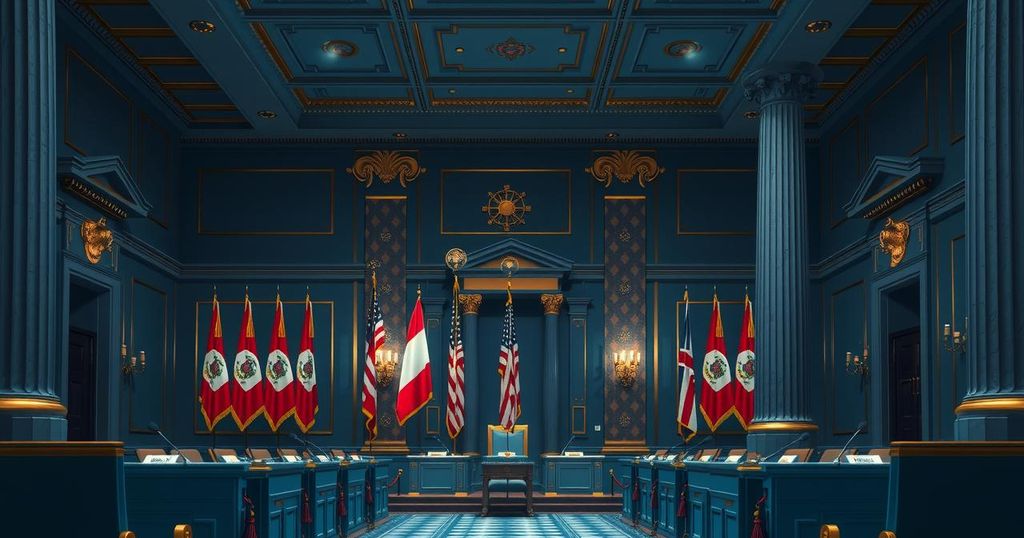Trump Grapples for Upper Hand in Debate Over Damage Caused by US Strikes on Iran

President Trump continues to challenge media coverage of U.S. airstrikes on Iran, arguing that the impact was far more significant than reported. He labels critiques as ‘Fake News,’ while asserting that the strikes dealt a severe blow to Iran’s nuclear capabilities. The situation adds complexity to ongoing diplomatic talks between U.S. and Iranian officials, indicating a delicate balance between military action and potential negotiations.
In the latest chapter of his ongoing foreign policy saga, U.S. President Donald Trump is in The Hague attending NATO’s annual summit, where the fallout from recent U.S. airstrikes against Iran remains a significant conversation starter. Trump has taken offense to reports speculating about the limited effectiveness of these strikes, accusing major media outlets of unjustly downplaying the impact on Iran’s nuclear infrastructure.
On Wednesday, Trump vehemently rejected a preliminary intelligence report that suggested the airstrikes only resulted in a slight setback for Iran’s nuclear endeavors. He insisted that the U.S. military executed what he called a “devastating attack,” and criticized intelligence agencies for not having a complete understanding of the situation. According to Trump, the airstrikes were a monumental success, claiming they “completely and fully obliterated” many of Iran’s nuclear facilities.
During his discussions, Trump revealed that Defense Secretary Pete Hegseth and other military officials would soon hold a press conference, aiming to defend the honor of U.S. pilots involved in the mission. Meanwhile, he expressed frustration over reports claiming the strikes had minimal impact, labeling such narratives as “Fake News.” The President’s remarks came amid a backdrop of discussions with NATO leaders, where security concerns regarding Europe were also on the agenda.
While some comments from Israeli officials indicated that Iran’s nuclear ambitions had taken a significant hit, they did not completely support Trump’s rushed assertions. In an interview, Secretary of State Marco Rubio cautiously stated that Iran was temporarily further from developing a nuclear weapon than before the strikes, albeit this does not provide complete assurance of long-term security.
The debate surrounding the effectiveness of the strikes is intensified by a variety of perspectives. Experts like Jeffrey Lewis, a professor specializing in nonproliferation, expressed skepticism regarding Trump’s claims of obliteration, suggesting that the situation is too fluid for such definitive statements. He emphasized the need for time to assess the actual damage inflicted on Iranian facilities.
Trump has also hinted that upcoming discussions between U.S. and Iranian officials could rekindle negotiations that were interrupted by the recent military actions. However, he claimed to be less concerned about reaching an agreement, suggesting that Iran might not be able to recover enough to pursue its nuclear agenda.
Trump’s sentiments about the strikes triggered his longstanding grievances against intelligence leaks and media coverage. He labeled reporters who published the intelligence assessments as “scum” and “disgusting,” reflecting his pattern of hostility towards institutions he believes undermine him. Former Defense Intelligence Agency officials state that the intelligence assessments are often preliminary and subject to rapid changes based on evolving situations.
As the fallout continues, experts like former Director of National Intelligence Leon Panetta assert that establishing a full understanding of the damage caused by the strikes will take time. CIA Director John Ratcliffe further supports Trump’s narrative by declaring that several key Iranian nuclear facilities were indeed decimated.
In an atmosphere of intense speculation, the future implications of these U.S. strikes on geopolitical stability in the Middle East are uncertain. Significant questions linger about the status of Iran’s nuclear material and the extent of damage done during what Trump has called “the 12-day war.” As ramifications are assessed, the potential for ongoing diplomatic dialogue amid heightened military tensions presents a complex narrative going forward.
In sum, President Trump’s declarations regarding the U.S. airstrikes on Iran have led to a contentious exchange of narratives between the administration and various media outlets. While some intelligence assessments suggest minimal setbacks in Iran’s nuclear program, Trump maintains that the attack was a resounding success. As further evaluations take place, the administration is confronted with the challenge of managing public perception while navigating the intricate dynamics of Middle Eastern relations and their implications for American foreign policy.
Original Source: apnews.com








